One-month pause in Gaza fighting now a focus of hostage release talks, sources say
Sources tell Reuters that the gaps have narrowed between Israel and Hamas, but the terror group is refusing to move forward with plans for truce until permanent ceasefire is agreed.
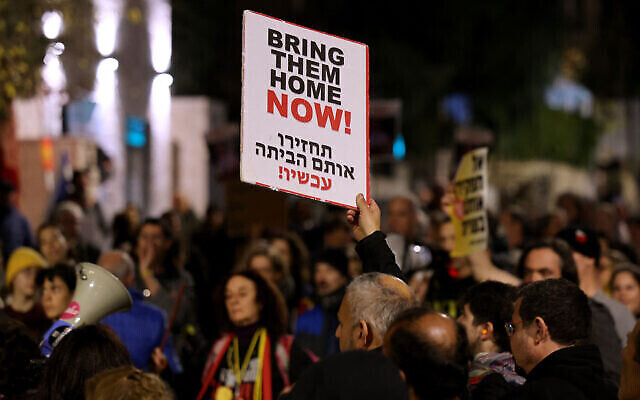
(THE TIMES OF ISRAEL) Israel and Hamas broadly agree in principle that an exchange of Israeli hostages for Palestinian prisoners could take place during a month-long ceasefire, but the framework plan is being held up by the two sides’ differences over how to bring a permanent end to the Gaza war, three sources told Reuters.
Intense mediation efforts led by Qatar, Washington and Egypt in recent weeks have focused on a phased approach to release different categories of Israeli hostages — starting with civilians and ending with soldiers — in return for a break in hostilities, the release of Palestinian prisoners and more aid to Gaza.
Israel is also said to have made an offer this week for a two-month ceasefire during which Hamas would release the hostages in exchange for Palestinian security prisoners in stages. Under the proposal, Yahya Sinwar and other top Hamas leaders in Gaza would be allowed to relocate to other countries.
An Egyptian official said earlier Tuesday that Hamas rejected the proposal.
The latest round of international shuttle diplomacy started on December 28 and has narrowed disagreements about the length of an initial ceasefire to around 30 days, after Hamas had first proposed a pause of several months, said one of the sources, an official briefed on the negotiations.
However, Hamas has since refused to move forward with the plans until the future conditions of a permanent ceasefire are agreed, according to six sources. Most of the sources consulted by Reuters requested anonymity in order to speak freely about sensitive matters.
While Israel has sought to negotiate one stage at a time, Hamas is seeking “a package deal” that agrees on a permanent ceasefire before hostages are released during the initial phase, said one of the sources, a Palestinian official close to the mediation efforts. Israel and Hamas are speaking through the mediators, not talking directly.
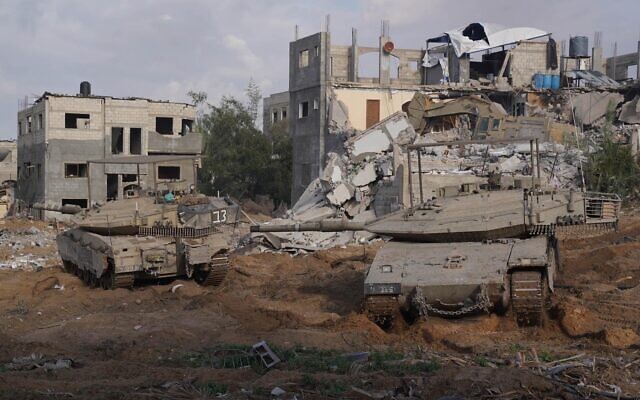
The US State Department and White House, Qatar’s foreign ministry and Egypt’s State Information Service did not immediately respond to requests for comment.
Two Egyptian security sources said that there was work underway to convince Hamas to accept a one-month truce to be followed by a permanent ceasefire. However, Hamas is requesting guarantees that the second phase of the deal would be carried out, in order to agree to the initial truce, the sources said.
The sources did not provide details of what such guarantees might consist of.
Asked about the negotiations, senior Hamas figure Sami Abu Zuhri told Reuters on Monday the Gaza-ruling terrorist organization was open to discussing ideas but that no deal was yet in place.
“We are open to all initiatives and proposals, but any agreement must be based on ending the aggression and the occupation’s complete pullout from Gaza Strip,” said Abu Zuhri.
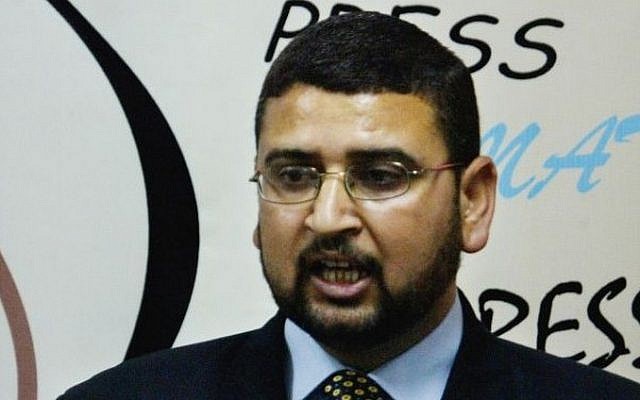
One offer by Israel is to end the war if Hamas removes six senior leaders from Gaza, said a seventh source, a senior Hamas official. However, Hamas “absolutely” rejected the proposal, he said.
The source said the list included the masterminds of the Hamas-led October 7 terror onslaught against Israel, such as Sinwar and Muhammad Deif, who are Israel’s top targets to kill or capture in the war and are thought to be hiding deep within Hamas’s extensive network of tunnels beneath Gaza.
Reuters was not immediately able to confirm this proposal with Israeli sources. Prime Minister Benjamin Netanyahu’s office declined a request for comment about the proposal or the broader negotiations.
Five of the sources said Israel had refused to discuss any end to the war that did not include Hamas being dismantled. They did not specify if exiling the leadership would meet that bar.
Israeli government spokesperson Eylon Levy said at a press conference on Tuesday that efforts were ongoing to secure the hostages’ release. He said Israel would not agree to a ceasefire deal that leaves Hamas in power in the enclave.
Qatar and Washington were instrumental in negotiating a week-long truce in November that led to the release of more than 100 of the 253 hostages kidnapped during the October 7 atrocities, in which Palestinian terrorists from Gaza also slaughtered some 1,200 people, mostly civilians. In return for the release of hostages, Israel agreed to free around 240 Palestinian prisoners and to an increase in humanitarian aid entering Gaza.
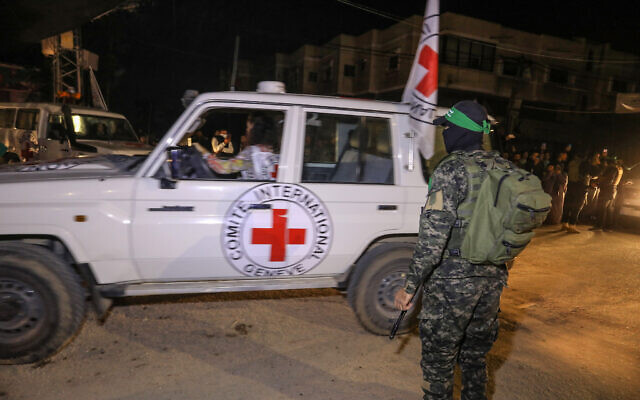
Starting on December 28, Qatar’s negotiators sent the framework of a new agreement to Hamas and Israel, asking both sides to indicate what they were prepared to agree to, the official briefed on the negotiations said.
When the two sides responded earlier this month, Hamas sought a truce that would last several months, while Israel wanted all the hostages freed in weeks, the official said.
Over the past few weeks, US and Qatari mediators have drawn the two sides closer to agreeing the 30-day process, which would include the release of all hostages, entry of more aid to Gaza and the release of Palestinian prisoners, the official said.
Despite the difficulty of bridging the gap in positions, one of the sources, briefed on the discussions, described the talks as intensive and said a deal could be agreed “at any minute.”
However, Hamas is seeking guarantees that Israel will not restart the fighting after the truce, a US source briefed on the matter and the Palestinian official said.
Hamas wants the United States, Egypt and Qatar to guarantee the implementation, and is concerned that Netanyahu’s government would resume fighting once Hamas frees civilian hostages, even if Israeli soldiers remain captive, the Palestinian official said.
During this round, Hamas had sought the release of all Palestinian prisoners from Israel’s prisons, including those that participated in the October massacres, the US source said. The official briefed on the talks said Hamas had since softened that demand, which would likely be vehemently opposed by Israel.
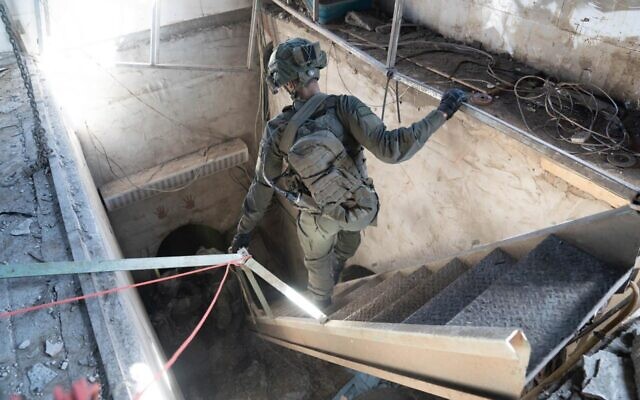
Hamas believes that before seriously talking about a long-term ceasefire, Israel wants to conclude its operations in Khan Younis, the southern city in Gaza that has seen the most intense offensive and fighting in recent weeks, the Palestinian official said.
Reuters could not immediately establish the status of discussions about whether Israeli forces would remain in Gaza during any prolonged ceasefire.
It is believed that 132 hostages abducted by Hamas on October 7 remain in Gaza. The IDF has confirmed the deaths of 28 of those still held by Hamas, citing new intelligence and findings obtained by troops operating in Gaza.
The bodies of eight hostages have also been recovered and three hostages were mistakenly killed by the military. One more person has been listed as missing since October 7, and their fate is still unknown.
Hamas has also been holding the bodies of fallen IDF soldiers Oron Shaul and Hadar Goldin since 2014, as well as two Israeli civilians, Avera Mengistu and Hisham al-Sayed, who are both thought to be alive after entering the Strip of their own accord in 2014 and 2015 respectively.

comments